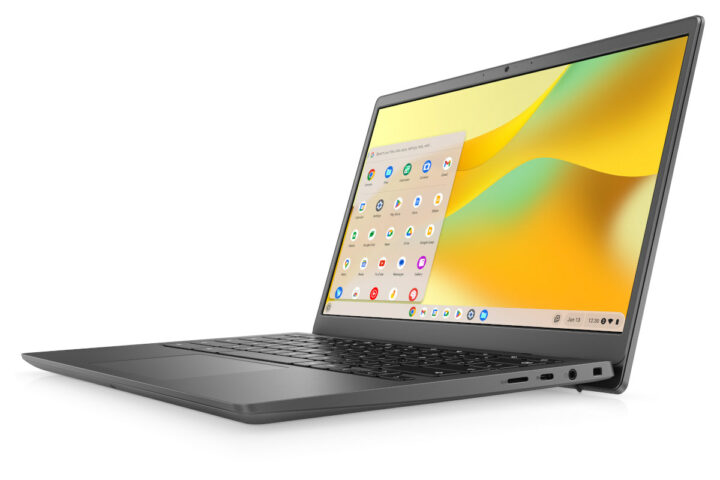AMD has just unveiled the Ryzen and Athlon 7020-C series processor family designed for Chromebooks, with up to four “Zen 2” cores clocked at up to 4.3 GHz, AMD RDNA 2 graphics, and promises of high power efficiency with Chromebook based on the entry-level Athlon Silver 7120C processor lasting up to an estimated 19.5 hours on a charge.
AMD says the Ryzen 3 7320C processor in the Dell Latitude Chromebook 3445 delivers 1.6 times higher average performance than a Chromebook based on the previous generation Ryzen 3 3250C processor and provides a 15% performance advantage with up to 3.5 hours longer battery life compared to the HP Chromebook MT7921 powered by an Intel Core i3-N305 “Alder Lake-N” processor.

Four models are available at launch: Ryzen 5 7520C, Ryzen 3 7320C, Athlon Gold 7220C, and Athlon Silver 7120C. All are 15W TDP parts, manufactured with a 6nm process, and come with AMD Radeon 610M graphics.
| Model | Cores / Threads | Base/Boost Frequency | Total Cache (MB) |
|---|---|---|---|
| AMD Ryzen 5 7520C | 4/8 | 2.8 / Up to 4.3 GHz | 6MB |
| AMD Ryzen 3 7320C | 4/8 | 2.4 / Up to 4.1 GHz | 6MB |
| AMD Athlon Gold 7220C | 2/4 | 2.4 / Up to 3.7 GHz | 5MB |
| AMD Athlon Silver 7120C | 2/2 | 2.4 / Up to 3.5 GHz | 3MB |
While the Athlon Silver 7120C promises up to 19.5 hours of expected battery life, it goes down as we go up the performance scale and this drops to 17 hours – still good for a full day – with the Ryzen 3 7320C processor. Chromebooks based on the new Ryzen and Athlon 7020-C series processors will be equipped with up to 16GB LPDDR5(x) memory and typically Wi-Fi 6 and Bluetooth 5.2 connectivity, and support up to three external 4K displays.
Chromebook systems featuring Ryzen and Athlon 7020 C-Series processors are expected in Q2 2023 (so that’s about now…) starting with the ASUS Chromebook CM34 Flip and Dell Latitude Chromebook 3445. The latter was used for performance and battery life comparisons and is already listed on the Dell website although pricing is not made public just yet. You may find more details about the new AMD Ryzen & Athlon processor in the press release and the product page.

Jean-Luc started CNX Software in 2010 as a part-time endeavor, before quitting his job as a software engineering manager, and starting to write daily news, and reviews full time later in 2011.
Support CNX Software! Donate via cryptocurrencies, become a Patron on Patreon, or purchase goods on Amazon or Aliexpress. We also use affiliate links in articles to earn commissions if you make a purchase after clicking on those links.





Article is missing the “Mendocino” codename. That’s what it is, 4-core Zen 2, 2 CU RDNA2 Mendocino rebranded for Chromebooks.
notebookcheck.net/AMD-Ryzen-5-7520C-Processor-Benchmarks-and-Specs.719601.0.html
These will live and die on price for me. Get the dual-cores down to $80-150 and quad-cores to $150-200 (on sale), and I’m interested.
Performance should be very similar to Alder Lake-N. Maybe Alder Lake-N has an edge in multi-threading, falls behind a little in single-threading. I’m not sure about the graphics, but they should be similar based on other comparisons of the Ryzen 7000 desktop iGPU (2 CUs) and desktop Alder Lake (32 EUs):
CPU:
cpubenchmark.net/cpu.php?cpu=AMD+Ryzen+5+7520U&id=5216
cpubenchmark.net/cpu.php?cpu=Intel+Core+i3-N305&id=5213
iGPU:
techpowerup.com/review/amd-ryzen-5-7600x/22.html
It’s kind of amazing how well-matched these CPUs are. They both added AV1 decode as well. But I think AMD might have the edge because single-threaded performance is more important at this level. That could help their efficiency claims.
I don’t understand these new Zen2 chips. It made sense when they were shipping older chips made on the older process. Getting extra use of old manufacturing to produce a lower cost part. But Amd have done a process shrink for these. Why not just sell lower binned zen3 or zen4 chips? Surely you’d get a better performance/power ratio?
The process shrink is unlikely to increase costs. TSMC 6nm was designed to be compatible with 7nm, TSMC probably wants most 7nm production to shift to 6nm, and eventually it will become a long-lived budget node.
Not too long ago, AMD was selling new Stony Ridge APUs on 28nm. That’s how I see Mendocino in the long term. Something they can make for years to come as 6nm gets cheaper, and it has all the performance you need for an entry-level laptop. Even if they start making “budget” chips on 5nm and below, like the rumored 2+4 hybrid “Phoenix 2” APU, Mendocino has its place.
Zen 2 is physically smaller than Zen 3 on the same node.
AMD already has a problem of binning 8-core dies and chiplets. It doesn’t make a lot of sense to turn those into dual-cores or even quad-cores. Zen 2 is designed around the quad-core CCX so it was a good match for Mendocino.
> TSMC 6nm … 7nm …
It’s processes called N6 and N7, both have nothing to do at all with 6nm or 7nm. At least according to TSMC’s vice president of corporate research, Dr. Philip Wong: ‘Today, these numbers are just numbers. They’re like models in a car – it’s like BMW 5-series or Mazda 6. It doesn’t matter what the number is, it’s just a destination of the next technology, the name for it’: https://www.youtube.com/watch?v=O5UQ5OGOsnM&t=422s
I know that, don’t care, doesn’t change how N6 is design compatible to N7.
So why not talking about N6 and N7 then? Why repeating this ridiculous marketing BS wrt nanometers?
> AMD was selling new Stony Ridge APUs on 28nm
Clueless readers will assume a ‘7nm process’ would have four times denser structures while in reality it’s just a random number introduced by marketing departments who try to fool consumers for a living… why do we rely on their marketing BS?